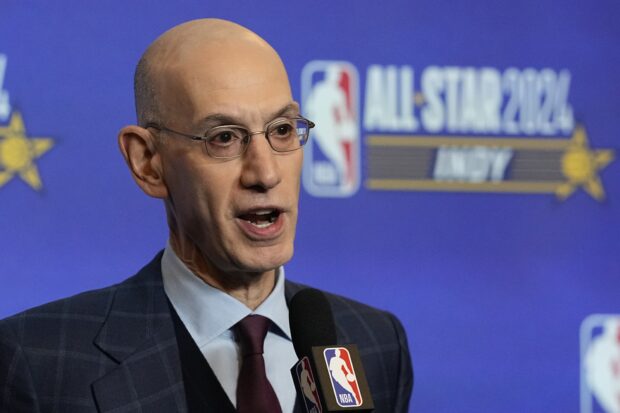NBA Scores, News, Schedules

NBA Commissioner Adam Silver speaks during a news conference during the NBA basketball All-Star weekend Saturday, Feb. 17, 2024, in Indianapolis. (AP Photo/Darron Cummings)
INDIANAPOLIS — In Adam Silver’s eyes, the NBA’s new 65-game policy is working.
The commissioner, in his annual All-Star weekend news conference, said Saturday night he believes the league’s rules, which mandate players must generally play in at least 65 games to be eligible for postseason awards, have had their intended effect.
“I can tell you that the number of games that players have participated in is up this season,” Silver said. “And interestingly enough, injuries are actually down.”
There has already been some impact. Philadelphia center Joel Embiid won’t win a second consecutive MVP award and his two-year reign as the league scoring champion will also end because he won’t play in enough games to qualify. Indiana guard Tyrese Haliburton’s next contract might be worth more than $50 million less than he hoped if he doesn’t play enough games to qualify for a supermax — and at his current pace, he’d come up a bit short. Miami’s Jimmy Butler has already missed too many games to be an awards candidate.
“I just don’t like it, how it forces players to play if they’re injured to achieve something,” Denver center Nikola Jokic said.
READ: NBA takes steps to try to ensure its star players appear in more games
The 65-game rule — which was collectively bargained with the NBA Players Association — went into effect this season and determines whether players are eligible for things such as the MVP award, an All-NBA Team, Defensive Player of the Year, an All-Defensive Team or Most Improved Player.
Silver said the league, as it does with most new policies, will review it after the one-year mark.
“Honestly, I do believe that if you win any type of award, I think you should have to play a significant amount of the season,” Boston forward Jaylen Brown said. “We’ve got guys who play half the season and win MVP. I’m not a big fan of that. But maybe 65 games might be a little too severe. Maybe they lessen it to 58 or something like that.”
In other news from Silver on Saturday:
IGNITE FUTURE
The G League Ignite, which has struggled this season, may be facing a most uncertain future.
The program was put together by the NBA to give players who aren’t yet eligible for the draft — but who didn’t want to go to college — a chance to essentially play professional basketball and prepare for the draft as part of a developmental but still competitive program.
But the changes of college rules and allowing athletes to cash in on their Name, Image and Likeness has made the college experience more attractive to those players. And as such, the gap in the system that the NBA felt Team Ignite would fill isn’t really a gap anymore.
“We are in the process of reassessing Team Ignite,” Silver said. “Some of those same players that didn’t want to be one-and-done players because they felt it was unfair and they wanted the ability to not just earn a living playing basketball but to do commercial deals that weren’t available to them in college … now all those same abilities have become available to them. So, I’m not sure what the future of Team Ignite will be.”
BACK TO PARIS
The NBA will play another regular-season game in Paris next season, and there are expectations in France that the San Antonio Spurs — featuring France’s Victor Wembanyama — will be in that game.
Silver wouldn’t confirm the Spurs heading to Paris next season, but said the league is still determining what arena to play in when it goes there in 2024-25.
“Stay tuned,” Silver said. “In terms of the Spurs playing in Paris, I can tell you that Victor Wembanyama … it’s certainly something that he very much would like to see, his team playing in Paris.”
PLAYER-REFEREE RELATIONSHIPS
There will never be a day when NBA players and referees stop disagreeing, but Silver acknowledged the relationship between the sides has some strains that can be improved.
Players tend to feel their concerns aren’t being heard, and when a call is missed teams are predictably quick to criticize.
“I think this is a real area of focus for us, and we’re going to be working on it,” Silver said. “It’s easy to say ‘respect for the game.’ I think people recognize how the communication works; it’s not a typical workplace and we have to take into account the high stress they’re under. … There just has to be a two-way sense of respect. And so, I’m sympathetic to the frustration and feel it’s an area where we can make progress.”